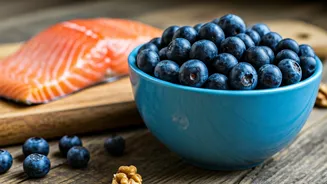Boost Brain Health
The first section underscores the importance of a healthy diet in promoting optimal brain function. Eating the right foods can provide the essential nutrients
that your brain needs to function at its best, enhancing memory, focus, and overall cognitive abilities. By making smart food choices, individuals can proactively support their brain health and reduce the risk of cognitive decline. Prioritizing foods rich in antioxidants, vitamins, and healthy fats is key to fueling the brain and keeping it sharp. Understanding the link between nutrition and brain health empowers individuals to make informed choices that can positively impact their mental performance and well-being. By integrating these foods into a daily routine, you can start to notice improvements in memory and cognitive clarity.
Berries: Memory Champions
Berries are rich in antioxidants, like flavonoids, which help protect the brain from oxidative stress and inflammation. These compounds can improve communication between brain cells, aiding in memory and learning. Eating a variety of berries, such as blueberries, strawberries, and raspberries, can provide a diverse range of these beneficial antioxidants. Research indicates that regular consumption of berries may slow down age-related cognitive decline and enhance memory performance. Moreover, the natural sugars in berries provide a steady energy source for the brain. Including berries in your diet is a delicious and effective way to support brain health. Berries are versatile and can be added to breakfast cereals, smoothies, or enjoyed as a snack.
Fatty Fish Power
Fatty fish, such as salmon, are packed with omega-3 fatty acids, crucial for brain health. These fats are building blocks for brain cells and support cognitive function, especially memory. Omega-3s can reduce inflammation in the brain and improve the transmission of signals between neurons, enhancing memory recall and learning. Including fatty fish in your diet can significantly boost your brain's performance. The brain uses these essential fatty acids to keep cells healthy and communicate effectively. Aim for at least two servings of fatty fish per week to optimize your intake of omega-3 fatty acids and support long-term brain health. Other sources of omega-3 include flaxseed and walnuts, but fatty fish is one of the most effective sources.
Nuts and Seeds
Nuts and seeds are excellent sources of vitamin E, an antioxidant that protects brain cells from damage. They also provide healthy fats, which are essential for brain function. Consuming a variety of nuts and seeds, such as almonds, walnuts, and flaxseeds, can boost memory and overall cognitive performance. These snacks offer a convenient way to get the nutrients your brain needs. Regular consumption has been linked to improved cognitive function and a reduced risk of cognitive decline. They also provide fiber and protein, keeping you feeling full and energized. Try adding nuts and seeds to your salads, yogurt, or enjoy them as a quick snack during the day to enhance your brainpower.
Green Leafy Veggies
Green leafy vegetables like spinach and kale are rich in vitamins, minerals, and antioxidants, which are crucial for brain health. These vegetables contain vitamin K, which plays a vital role in cognitive function and memory. The high levels of antioxidants protect the brain from damage, while the folate supports healthy brain development. Eating green leafy vegetables regularly can help improve memory and prevent cognitive decline. Including these vegetables in your diet is a simple yet effective way to support your brain's health. Incorporate them into salads, smoothies, or as a side dish to maximize their benefits and support cognitive function. The vitamins and nutrients they contain are essential for maintaining a healthy and efficient brain.
Avocado Benefits
Avocados are a source of healthy fats that support blood flow to the brain, enhancing cognitive function and memory. These fats improve the health of brain cells and facilitate efficient communication between them. The monounsaturated fats found in avocados help keep the brain healthy. The fruit also offers several vitamins and minerals that are essential for brain health. Avocados can be incorporated into many meals, from toast to salads, to boost your memory. Their high nutrient content and healthy fats help to improve overall cognitive function. They offer a creamy texture and are a delicious addition to almost any meal. Regular consumption of avocados will significantly improve brain health and cognitive abilities.
Whole Grains: Focus Boost
Whole grains provide a steady supply of glucose, the brain's primary energy source. They also contain fiber, which helps regulate blood sugar levels, preventing spikes and crashes that can impair cognitive function. Whole grains contain vitamin E, an antioxidant that protects the brain. Eating whole grains like brown rice and quinoa supports healthy brain function and memory. These foods keep your brain fueled throughout the day and help maintain focus and concentration. Choosing whole grains over refined grains is a great step to better brain health. The steady release of glucose will lead to improved cognitive abilities. Whole grains contribute to sustained brain health and enhanced cognitive performance.
Dark Chocolate Delight
Dark chocolate contains flavonoids, powerful antioxidants that improve blood flow to the brain, enhancing memory and focus. These antioxidants can also protect the brain from damage. Dark chocolate stimulates the production of endorphins, which can improve mood and reduce stress, thereby positively impacting cognitive performance. It is a delicious treat that offers cognitive benefits, provided it is consumed in moderation. Choose dark chocolate with a high cocoa content for the greatest benefits. Enjoying a small amount of dark chocolate regularly can boost your memory and cognitive function. This indulgence can be a delightful and effective way to support your brain's health.
Eggs: Brain Fuel
Eggs are an excellent source of choline, a nutrient crucial for memory and brain function. Choline is used to produce acetylcholine, a neurotransmitter that plays a vital role in memory and learning. Eggs also provide protein and essential nutrients that support overall brain health. The nutrients in eggs contribute to better brain function. Eating eggs regularly can enhance memory and cognitive performance. From breakfast to snacks, eggs offer many nutritional benefits to keep your brain healthy. Including eggs in your diet is a tasty and effective way to give your brain a boost, helping to improve memory recall and overall brain function. The nutrients contained in eggs contribute to optimal brain function.
Turmeric: Memory Magic
Turmeric contains curcumin, a powerful antioxidant and anti-inflammatory compound that can boost memory and brain function. Curcumin can cross the blood-brain barrier, offering direct benefits to brain cells. It helps to reduce inflammation, which can impair cognitive function. The spice has been linked to improved memory and cognitive performance. Including turmeric in your diet, such as adding it to curries or smoothies, is a tasty way to support your brain health. Turmeric can play a key role in improving brain function. Regular consumption of turmeric can significantly enhance memory and cognitive abilities. Its anti-inflammatory properties can protect brain cells and improve cognitive performance.























